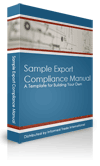An export license, issued by the U.S. government, is required to transfer of technology, software, and equipment to non-U.S. persons. As part of an export license, the government attaches riders and conditions that all parties to the license must satisfy. An Internal Control Plan (ICP) communicates how the requesting company and other parties to a […]
Posted on April 26th, 2011 by admin
Filed under: ITAR | Comments Off on INTERNAL COMPLIANCE PLAN (ICP)
An important issue facing defense contractors today is exactly how much information should be shared with the Government about internal deficiencies with an import/export compliance program. Empowered Officials (EOs) and corporate executives are often uneasy about opening doors through which enforcement agencies may pass and ultimately cause irreparable harm to the company, its reputation, and […]
Posted on February 1st, 2011 by admin
Filed under: ITAR | Comments Off on ITAR Self-Enforcement: How Much Do We Tell the Government?
Globalization, terrorism and threats of proliferation have led to an increase in the enforcement of U.S. export control laws by the federal government. These laws provide for severe civil and criminal penalties for the unauthorized disclosure of sensitive technology to foreign citizens. Technology-related clients of all sizes are increasingly finding themselves in violation of such […]
Posted on May 14th, 2009 by keeton
Filed under: EAR, ITAR | Comments Off on Export Control Laws
A reader recently asked me: There has been a question of cell phones with cameras in them. Is there a policy or a standard practice we can incorporate? Should we have all guests and employees leave them in their cars or store them in specified places? Off the top of my head, there are three […]
Posted on May 11th, 2009 by keeton
Filed under: ITAR | Comments Off on ITAR Policy: Camera Phones
When I was a kid, my father used to provide me with a wealth of important “life lessons,” doled out in simple one-liners that I could carry with me as I grew older. One of my favorites was “If you’re going to run with the pack, make sure you’re the leader.” Another that has served […]
Posted on July 15th, 2008 by keeton
Filed under: ITAR | 1 Comment »
Methods for Improving Ethical Trade Compliance of an Organization Jarred A. Fishman In an increasingly complicated and transnational business world, there is now greater importance than ever before placed on the ability of the export compliance regime to act in a positive ethical manner. This paper will seek to develop several themes. First I will […]
Posted on June 6th, 2008 by keeton
Filed under: EAR, ITAR | 1 Comment »
What is a DSP-73 Export License? Other than the DSP-5 Export License, the DSP-73 is the type of license I hear referenced most often in the export compliance community. The purpose of a DSP-73 license is to allow for the temporary (not permanent) export of controlled goods regulated by the Department of State. This means […]
Posted on June 4th, 2008 by keeton
Filed under: ITAR | 8 Comments »
Below is a link to the US Department of Justice’s Fact Sheet: Major U.S. Export Enforcement Actions in the Past Year. Please pass it along to anyone who doesn’t believe that people ever get in trouble for export violations. A few that stood out for me: Excellence Engineering Electronics – Restricted Technology to China ITT […]
Posted on May 22nd, 2008 by keeton
Filed under: EAR, Espionage, ITAR, News | Comments Off on Export Enforcement Actions in 2007
Not too long ago, I helped to develop a compliance program for a well know defense contractor who’s business was the US sale of communications systems for commercial and military aircraft. Their primary issue was not licensing for the export of their products, but rather that their sales and marketing departments were in the US […]
Posted on May 22nd, 2008 by keeton
Filed under: ITAR | 6 Comments »
While exporting grenade launchers to an unfriendly nation might be a cut and dried State Department licensing procedure, a more slippery and often significantly more treacherous export is that of technical data. With the evolution of the internet and an ever-shrinking world, this less tangible export is (in my opinion) far more dangerous to the […]
Posted on May 21st, 2008 by keeton
Filed under: ITAR | 2 Comments »


